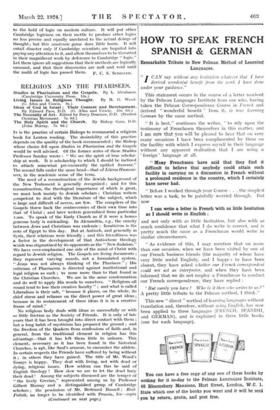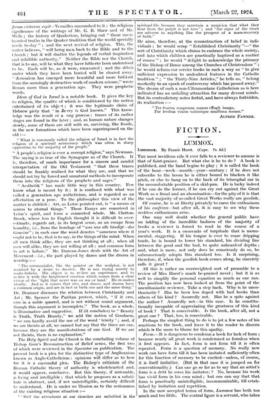RELIGION AND THE PHARISEES.
Living Issues in Religious Thought. By IL G. Wood. (G. Allen and Unwin. 6s.) Ideas of God in Israel : Their Content and Development.
Christian Movement. 7s. 6d.)
The Holy Spirit and the Church. By Bishop Gore, D.D. (John Murray. 7s. 6d.) IT is the practice of certain Bishops to recommend a religious book for Lenten reading. The desirability of this practice depends on the quality of the book recommended ; the Bishop whose choice fell upon Studies in Pharisaism and the Gospels would be well advised. Of the former series of these. Studies Professor Sanday wrote : " We see the spirit of true scholar- ship at work. It is scholarship to which I should be inclined to attach somewhat pre-eminently the epithet humane." The second falls under the same head—that of Literae Humani- ores, in the academic sense of the term.
The need of a reconstruction of the Jewish background of the New Testament is generally recognized ; and for this reconstruction, the theological importance of which is great, we must look mainly to Jewish scholars ; Christian writers competent to deal with the literature of the subject, which is large and difficult of access, are few. The compilers of the Gospels threw back the controversies of their own time into that of Christ ; and later writers generalized from particular
:Ises. To speak of the Early Church as if it were a homo- geneous body is misleading. In Alexandria, e.g., the enmity
between Jews and Christians was endemic ; fanaticism is the note of Egypt to this day. But at Antioch, and generally in Syria, their relations were friendly ; and this friendliness, was a factor in the' developnient of that Antiochene theology w:iich was stigmatized by its opponents as the " New Judaism." We have over-emphasized one side of the mind of Christ with regard to Jewish religion. The Gospels are living documents ; they represent varying moods, not a formulated system. " Jesus was not always thinking of the Pharisees " ; His criticism of Pharisaism is directed against institutional and legal religion as such ; to none more than to that found in the Christian Churches. We are in the same condemnation and do well to apply His words to ourselves. " Religions all round tend to lose their creative faculty " ; and what is called Liberalism is their salt, " because it places, on the whole, its chief stress and reliance on the direct power of great ideas ; because in its restatement of these ideas it is in a creative frame of mind."
No religious body deals with ideas so successfully or with so little friction as the Society of Friends. It is only of late years that it has been brought into direct contact with them ; but a long habit of mysticism has prepared the ground ; and the freedom of the Quakers from confessions of faith and, in general, from the traditional element in religion has this adliantage—that it has left them little to unlearn. This element, necessary as it has been found in the historical Churches, is apt, like Saurs armour, to encumber the athlete. In certain respects the Friends have suffered by being without it ; in others they have gained. The title of Mr. Wood's Essays is happy. They deal with living, not with dead or dying, religious issues. How seldom can this be said of English theology ! How slow we arc to let the dead bury their dead t. Among the subjects discussed are the temper of " the lively Grecian," represented among us by Professor Gilbert Murray and a distinguished group of Cambridge
scholars ; the pessimism of Mr. Bertrand Russell ; Real- Politik, no longer to be identified with Prussia, for—eapla (Continued on' next page.) ferum victorens cepit—Versailles succumbed to it ; the religious
significance of the writings of Mr. G. B. Shaw and of Mr. Wells ; the history of Quakerism, bringing out " those unex- hausted truths in the Quaker tradition that the world specially needs to-day " ; and the next revival of religion. This, the writer believes, " will bring men back to the Bible and to the Church ; but it will shatter the legends of verbal inspiration and infallible authority." Neither the Bible nor the Church,
that is to say, will be what they have hitherto been understood to be. Each will be, as it were, excavated ; and the debris
under which they have been buried will be cleared away. Jerusalem has emerged more beautiful and more brilliant from the seemingly destructive work of modern science," wrote Henan more than a generation ago. They were prophetic words.
Ideas of God in Israel is a notable book. It gives the key to religion, the quality of which is conditioned by the notion entertained of its obje-t ; it was the legitimate claim of
Hebrew piety that " in Jewry is God known." This know- ledge was the result of a ong process : traces of its earlier stages are found in the later ; and, as human nature changes slowly, some of them are still with us, surviving, like fossils, in the new formations which have been superimposed on the old :—
"What is commonly called the religion of Israel is in fact the religion of a spiritual aristocracy which was often in sharp opposition to the majority of the people."
" A people's religion is ever a corrupt religion," says Newman. The saying is as true of the Synagogue as of the Church. It is, therefore, of much importance for a sincere and candid interpretation of the Old Testament " that these traces should be frankly realized for what they are, and that we should not try by forced and unnatural methods to incorporate them into the religions of the prophets and sages."
" Aesthetik " has made little way in this country. Few know what is meant by it ; it is confused with what was called a generation ago aestheticism, and is regarded as an affectation or a pose. To the philosopher this view of the
matter is childish ; Art, as Lotze pointed out, is " a means of across to eternal things." These Essays are conceived in
Lotze's spirit, and form a connected whole. Mr. Clutton- Brock, whose, loss to English thought it is difficult to over-
estimate, regards art, in its largest sense, as an escape from banality, i.e., from the bondage of "was tins alle bdndigt—das Gemeine" ; in each ease the word denotes "sameness where it
ought not to be, that is to say, in the things of the mind. When all men think alike, they are not thinking at all ; when all men will alike, they are not willing at all ; and common form in art is failure." Mr. Duncan-Jones deals with the Art of Movement—i.e., the part played by dance and the drama in worship :-
" The ceremonialist, like the painter or the sculptor, is not motived by a desire to deceive. He is not trying merely to make-believe. His object is to re-live an experience, and to re-live it with the heightened emotion which comes from a clear vision of the ' light that never was on sea or land.' He re-makes ideally. And so it comes that rite, and dance, and drama have a donunon origin, and are in fact at birth one and the same thing."
Dr. Dcarmer discusses the relation between Christianity and Art ; Mr. Spencer the Puritan protest, which, " if it errs, errs in a noble quarrel, and is not without sound argument, though this argument is incomplete." The book, as a whole, is illuminative and suggestive. If (it concludes) to " Beauty is Truth, Truth Beauty," we add the notion of Goodness, " we can hardly avoid the use of the word ' trinity ' ; and, if we are theists at all, we cannot but say that the three are one, because they are the manifestations of one God. If we are not theists, there is no explanation."
The Holy Spirit and the Church is the concluding volume of Bishop Gore's Reconstruction of Belief series, the first two of which were reviewed in the Spectator on publication. The present book is a plea for the distinctive type of Anglicanism known as Anglo-Catholicism : opinions will differ as to how far it is a successful plea. The Bishop's criticism of the
Roman Catholic theory of authority is wholehearted and, it would appear, conclusive. But this theory, if untenable, is living and intelligible ; that which he proposes as a substi- tute is abstract, and, if not unintelligible, certainly difficult to understand. He is under no Illusion as to the seriousness of the existing religious situation :-
" ' Half the attendants at our churches are enfeebled in the spiritual life because they entertain a suspicion that what they hear from the pulpit is not true ' ; and ' the signs of the times are adverse to anything like the prospect of a mass-recovery of faith."
He aims, therefore, at the reconstruction of belief in indi- viduals ; he would scrap " Established Christianity "—" the sort of Christianity which claims to embrace the whole society, and into which children are practically baptized as a matter of course " ; he would " delight to acknowledge the primacy of the Bishop of Rome among the Churches of Christendom " ; he would reform our service books in such a way as " to give sufficient expression to undoubted features in the Catholic tradition " ; " the Thirty-Nine Articles," he tells us, " belong markedly to an epoch of controversy which has passed away." The dream of such a non-Ultramontane Catholicism as is here indicated has an unfailing attraction for many devout minds. But its contradictory notes forbid, and have always forbidden., its realization :—
" Ter frustra conprensa mantis effugit imago, Par levibus ventis volucrique simillima soinno."
ALFRED FAWKES.















































 Previous page
Previous page